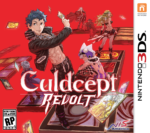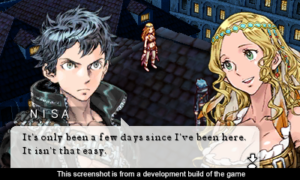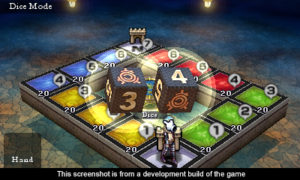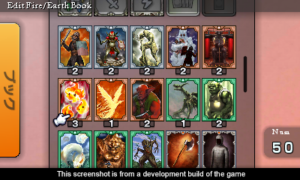Culdcept Revolt (3DS)
 Culdcept Revolt brings the “Monopoly meets trading card game” back for another round. Roll to move, but fight monsters instead of purchase properties, and upgrade terrain rather than place houses or hotels. The game does not end end with elimination, it ends when one player collects enough magical power. An enjoyable game if one is willing to look past the somewhat random nature of the dice.
Culdcept Revolt brings the “Monopoly meets trading card game” back for another round. Roll to move, but fight monsters instead of purchase properties, and upgrade terrain rather than place houses or hotels. The game does not end end with elimination, it ends when one player collects enough magical power. An enjoyable game if one is willing to look past the somewhat random nature of the dice.
The story of Culdcept Revolt centers around the main character (who has amnesia – surprise!) in a town strictly controlled by a nasty dictator. Your character makes a few friends who band together to try to overthrow the government or at least distract them enough to escape the city to the freedom beyond. Challenge the enemy characters in a Culdcept “duel” as you try to recover your memories and take down “the man.”

The core of Culcept is a Monopoly style game. Players roll the dice and move around the board, claiming spaces (called lands) and paying out “rent” when landing on opponents’ lands. Players begin the game with a deck of cards comprised of action cards and creature cards. Both cost resources to play. When landing on an open land, a player can take control by playing a creature card which then occupies that land. Landing on an opponent controlled land allows a player to challenge the creature on the space for control. Battles consist of the two creatures attacking each other, modified by a possible additional spell card. Defeat the occupying creature to take control with your own, but lose (or pass on the chance to attack) and you need to pay the “rent” in your own resources.

There are four colors on the board, and claiming additional spaces in the same color (they don’t need to be adjacent) increases their value and their “rent.” Creatures also come in four colors (and a neutral one) and if they match the land they occupy, the get additional defence. One can spend resources to upgrade a land, which increases the “rent” but also increases the defense bonus granted by the land.

In addition to the main gameplay, players are also managing their deck of cards. Players gain cards and money over time, and additional card “packs” can be purchased with the in-game money to expand one’s options for their deck. As the story progresses, more powerful cards become available, although this is somewhat offset as the most powerful cards cost more resources to use in the game.
Verdict:
I really, really want to love this game but can only say that I like it. It suffers from the same problems found previously in the series. The two main issues are the random factor of the dice rolls and the time it takes to complete a game. The capriciousness of the dice are not a deal breaker, as it is simply an expected part of the game. One must have contingency plans to mitigate poor rolling and it is rare for a game to be won or lost on just a few bad rolls. There are even spell cards that force a player (you or your opponent) to “roll” a specific number.
The biggest problem lies with the length and pace of the game. A single game can run on for 30 minutes or more. When playing through the single player campaign, almost every new contact results in a duel (with one or more opponents.) Thus long-ish games can really eat up one’s time. Don’t get me wrong, I do find the game fun but it just doesn’t move along as fast as I would like. Each game is peppered with animations showing the cards your opponents are casting, their duels, their die rolls, and even random comments along the way. There are a few options to speed up text, but not enough. I find much of my game spent repeatedly clicking buttons to get through messages and options to get to the point where I can play and/or make decisions. As I said, this isn’t quite a deal breaker, but it is something that has been a problem in the earlier games in the series. This also contributes to the random dice problem. In a long game, there can be (occasionally) situations where the game is quite close and it comes down to one or two rolls where the first player to land on an opponent’s square will lose. Losing a close game after 20 minutes or more of playing is a frustrating experience.
If you really dig Monopoly and want to see a cool twist on the concept, Culdept Revolt is a very neat game. Players who are just interested in seeing a new style of boardgame will also find a winner in the game. However, I feel sad that the game doesn’t provide options to make the boardgame part of the game progress at a faster pace. (Faster games also mean bad die rolls aren’t such a bad deal, since starting over isn’t all that big a deal.)
Kid Factor:
A pretty easy game to figure out, although there is a fair amount of text. All the creatures and story elements are free of “blood & guts” although a main character or two may be eliminated along the way. The game can be played with up to 4 people locally or online. Of course, all the standard warnings for online gameplay for children apply.





Discussion Area - Leave a Comment